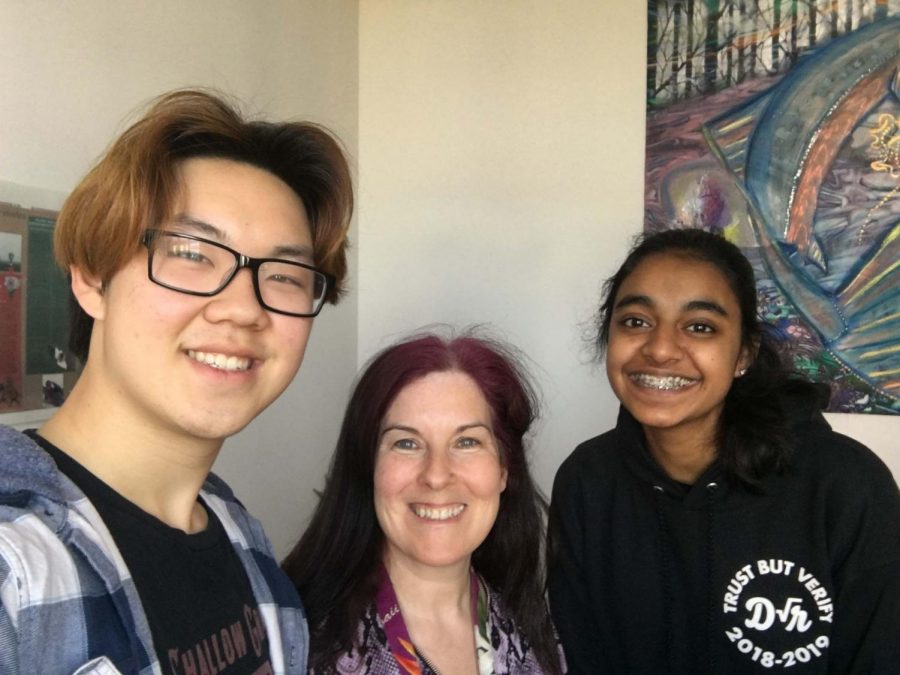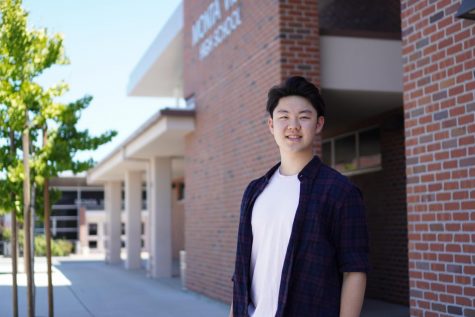Authors around us: Emer Martin
Exploring how FUHSD teacher Emer Martin became a published author
Journalism teacher and author Emer Martin poses following the interview.
October 25, 2019
Emer Martin, outside of being journalism advisor and English teacher at Fremont HS, is a professional author. Last year, she published her seventh novel, “The Cruelty Men” — a realistic fiction piece detailing the abuses suffered by Irish families in the 1900s. Listen below to learn more about Martin’s journey as an author, including her childhood passion for writing and the inspiration behind her most recent novel.
What inspired you to become a writer?
I wanted to be a writer since I was about eight years old, I was obsessed. So I used to write every night before I’d go to bed; I’d write one page and I’d draw a picture. So I had notebooks after notebooks of all this stuff. And I come from Ireland, so it’s a culture that really values writers. Like when we had a money system before the Euro, we didn’t have kings or queens on the money — we had writers. So there was a writer on every note we had, so they really were valued in the culture.
I used to write poems. And I decided I’d write sonnets, so I set myself a task, I remember, for a couple of months to write a sonnet every night.
I think [my interest] was cultural; I think if you grow up in Silicon Valley, you want to be Elon Musk, but you grow up in Ireland, you want to be James Joyce. The culture is very influential. Like if you’re in LA, you probably want to be Harrison Ford or Kim Kardashian or somebody like that. So I would say it was a huge cultural influence. I wanted my life, kids too, to have value. And I looked around and thought everybody really takes the writers seriously. And also this desire to tell a story — Ireland’s a storytelling culture, so everybody tells stories all the time. So it’s almost in our blood just to tell stories.
How does your Irish background inspire/affect your writing?
Well the last book I wrote, ‘The Cruelty Men,’ was the first book I set entirely in Ireland, and I’d never done that before. And I was really trying to write a novel that faced Irish history and looked at where we were now, and to try and come to terms with the trauma of the past, because Ireland was colonized by England, and it was very brutal and a lot was wiped out. And the language, so much violence and famine — people had come through all that and I still think it had an effect on the culture. And it’s how Irish people see themselves. There was so much suffering throughout history, so I really wanted to write a novel that would address some of the huge sweep of history. So it was an ambitious novel.
When and how did you make the decision to write about the Irish and the English colonization of Ireland?
It’s strange with fiction because I don’t think there’s any logical decisions. What happens is I start writing what I think I’m going to write, and it turns out to be terrible. And then somewhere in all that awfulness, I will find a thread and go, ‘Oh, I’m liking that part. That part is coming to me more easily.’ So I started writing and — typically you get the luxury of that in fiction that you don’t get in journalism — I threw away the whole first 30 pages and went, ‘Okay, that was like clearing my throat.’ And then came the part that I wanted to write.
How do you stay grounded during your intense schedule and keep yourself going through this while keeping your passion for writing?
I think, you know, part of me thinks, ‘When I finish this book, this will be my last book. I’m done, I’m done.’ But then what happens is, and I think what happens to every artist, is that it’s almost not a luxury in your life, it’s this need to create, the need to write, to paint, to make films, to draw — that need, because I’m happiest when I’m involved in a project and I’m preoccupied. Otherwise, life seems pretty flat. There’s something kind of one-dimensional about my life when I’m not creating. I wouldn’t wish that on anybody.
Can you give us a small preview for your next book?
It’s a sequel in some ways to ‘The Cruelty Men,’ but it’s a standalone book. But I’m taking the characters I finished with, I’m taking their children and bringing it on. So the idea is, as well, that it will eventually be a larger work that will show how the past affects the present. I’m bringing it up to modern day, to now.
I was living back in Ireland, and I was driving along, listening on the radio, and there were these two reports about abuse of the church that had come out, the Murphy Report and the Ryan Report, and people suddenly were telling these stories and nobody had heard these stories before, or nobody had listened to these stories, because it was mostly children of the poor. And they’d be taken into industrial schools or laundries or insane asylums and there was a huge amount of sexual, physical, emotional abuse. And when they got out, nobody believed them and nobody cared. And the more I heard their stories, sometimes I would have to pull over in the car and just sit there and digest it and go, ‘Did this happen?’ So I went and got the reports and read them all, and it was the most chilling, devastating things I’d read, because these people were all children and they had gone through such terrible abuse. So I thought, ‘This was the story of the twentieth century, it hasn’t been told.’ People only found out about it, we had family members who had gone through things and we only found out when they were in their seventies. Because there was a whole time of Ireland, it was like suddenly, everybody was telling this story. And it turns out everybody had a story, everybody knew somebody, everybody had witnessed something, and it was the power of the Catholic Church in Ireland at the time along with the government that nobody dared to speak out. So this was a moment.



















